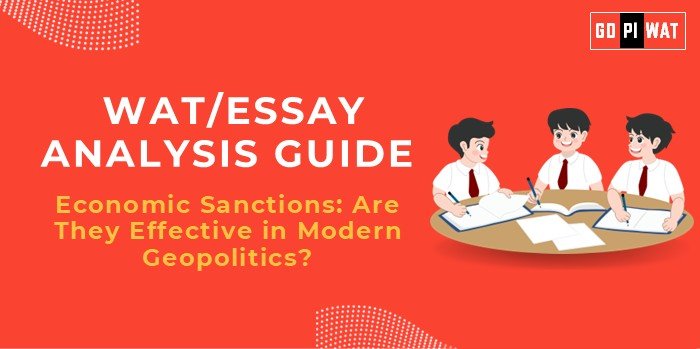📋 Written Ability Test (WAT) / Essay Analysis Guide
Topic: Economic Sanctions: Tools of Diplomacy or Instruments of Suffering?
🌟 Introduction Techniques
- Contrast Approach:
“Economic sanctions stand as tools of both justice and hardship. While they effectively pressured South Africa to dismantle apartheid, they also exacerbated poverty in Iraq during the 1990s, reflecting their dual-edged nature.”
- Data-Driven Approach:
“Over 30 countries face sanctions globally, impacting economies and civilians alike. Sanctions against Russia, for example, slashed its GDP by 2.1% annually but raised questions about collateral damage and enforcement efficacy.”
📊 Structuring the Essay Body
🏆 Paragraph 1: Achievements
- 📜 Example 1: Iran’s temporary compliance with the Joint Comprehensive Plan of Action (JCPOA) due to sanctions.
- 🌍 Example 2: The role of sanctions in ending apartheid in South Africa, demonstrating their ability to address systemic issues.
⚠️ Paragraph 2: Challenges
- 📉 Challenge 1: Humanitarian impact, with Iraq serving as a cautionary example of widespread civilian suffering under sanctions in the 1990s.
- 🔍 Challenge 2: Evasion strategies, such as Russia’s pivot to alternative markets and trade systems with nations like China.
🚀 Paragraph 3: Future Outlook
- 💡 Technological Solutions: Proposing the use of AI and blockchain to monitor compliance and curb evasion.
- 🤝 Global Cooperation: Emphasizing the importance of multilateral enforcement to ensure effectiveness.
📄 Concluding Effectively
- Balanced Perspective Conclusion:
“Economic sanctions are powerful yet imperfect tools. Their future lies in precision targeting, international collaboration, and minimizing collateral damage to ensure effectiveness without undue harm.”
- Future-Focused Conclusion:
“As geopolitics evolve, sanctions must adapt with technology-driven enforcement and multilateral frameworks, ensuring a balance between achieving objectives and maintaining humanitarian ethics.”
✍️ Sample Short Essays
- Balanced Perspective:
“Economic sanctions are indispensable in modern diplomacy but often come with significant challenges. While successful in pressuring Iran on its nuclear program, they have also caused humanitarian crises, as seen in Iraq. To maximize their impact, a nuanced approach balancing enforcement and empathy is essential.”
- Solution-Oriented:
“To address the limitations of sanctions, nations must adopt targeted measures that focus on key decision-makers rather than broad economic restrictions. Integrating technological tools like AI can enhance enforcement, while diplomatic outreach ensures long-term solutions.”
- Global Comparison:
“The use of economic sanctions reflects a global divide in strategies for addressing international conflicts. While the West relies heavily on sanctions, their success, as in South Africa, or failure, as in Cuba, underscores the need for consistent and collaborative frameworks to ensure efficacy.”
🌟 Advanced Analytical Frameworks for WAT
SWOT Matrix:
- 💪 Strengths: Non-violent pressure mechanisms; ability to isolate aggressors.
- 📉 Weaknesses: Potential for humanitarian harm; risk of non-compliance.
- 🌍 Opportunities: Use of technology for better enforcement; increased global partnerships.
- ⚠️ Threats: Retaliatory measures; diminishing effectiveness due to sanction fatigue.
PESTLE Analysis:
- ⚖️ Political: Leveraging international alliances for coordinated sanctions.
- 📈 Economic: Impact on global trade and targeted nations’ GDP.
- 👥 Social: Unintended consequences on civilians and societal infrastructure.
- 💡 Technological: Role of monitoring tools like blockchain to enhance compliance.
- 📜 Legal: Challenges in enforcing global sanction laws.
- 🌱 Environmental: Potential benefits of reduced industrial output in sanctioned regions (e.g., Russia’s reduced oil exports).
❌ Common Pitfalls to Avoid
- ❌ Writing Mistakes: Avoid generic claims without supporting data; ensure balance by acknowledging both achievements and challenges.
- ❌ Content Errors: Avoid outdated statistics and ensure verified recent sources; discuss both intended and unintended impacts.
🏫 B-School Connections for WAT/Essays
- 📘 Key Insights: Understand sanctions’ impact on international trade and business strategies; explore their ethical dimensions in policy decisions.
- 🎓 Interview Readiness: Be prepared to discuss case studies like Russia, Iran, and South Africa; develop insights into how sanctions affect industries like energy and technology.


